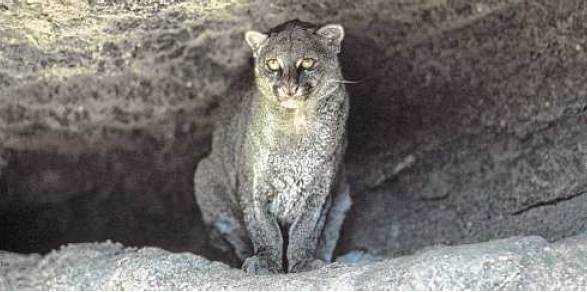Rancher sues ConocoPhillips to protect endangered cat’s habitat
By Elena Bruess STAFF WRITER
A Texas rancher has sued a national oil and gas company that he accuses of harming the habitat of an endangered species of wildcat on his property in DeWitt County.
Mike Hamilton, co-owner of his family’s ranch near Cuero, filed a lawsuit in late January against Burlington Resources Oil and Gas Co. LP and its parent company, ConocoPhillips, saying the defendants intend to drill in a pasture where the jaguarundi, an endangered cat, has reportedly been sighted multiple times.
The landowner said he isn’t seeking to stop all oil and gas production on his property. Rather, Hamilton is asking the company to refrain from drilling in an area that he says is “ideal habitat” for the jaguarundi. He’s asking for a halt to all proposed activities that could modify or destroy the habitat, or disturb the jaguarundis with sound, light or construction, according to the lawsuit filed Jan. 20 in the U.S. District Court for the Southern District of Texas Victoria Division.
Also, Hamilton is asking that ConocoPhillips be required to pay about $54,000 to the U.S. government for what he said are past violations of the Endangered Species Act related to initial construction on the jaguarundis’ habitat.
“I’ve been given the responsibility of the family’s property,” Hamilton said. “My father and grandfather protected this pasture where the jaguarundis are as basically a wildlife sanctuary, and it’s been treated that way for 50 years. You can’t protect a species if you destroy its habitat.”
ConocoPhillips has 30 days from the lawsuit’s date of filing to respond. It has yet to do so.
In a statement, ConocoPhillips said it received information in 2020 of an unconfirmed past sighting of a jaguarundi near the future drilling pad site, and that out of an abundance of caution, it hired a consultant to conduct a threatened and endangered species survey, which did not yield evidence that jaguarundis were present.
The oil and gas company also said that it followed many voluntary best practices outlined by the U.S. Fish and Wildlife Service and that it remains open to communication and collaboration with Hamilton and the Fish and Wildlife Service.
The jaguarundi — sometimes mistaken for a panther or a cougar — is a midsize wildcat, normally gray or red. The animal can be found from Argentina to southern Texas, and it was placed on the endangered species list in 1975 due to a loss of habitat, such as dense brush that has been cleared for farming or development.
Some believe that the cat no longer exists in the United States, but there have been several sightings in recent years. Hamilton’s lawsuit alleges that at least 10 people claim to have seen the jaguarundi on his property in the past decade. The sightings have been confirmed as credible, according to the Fish and Wildlife Service.
These sightings, Hamilton said, have been primarily on the north side of the ranch, an area that the rancher told ConocoPhillips to leave alone when he agreed to a lease with the company in 2007. Hamilton said the oil and gas company did not touch this pasture for several years. But he said that in 2020, the company planned to build a 6- to12-acre drilling pad and a drilling rig near the optimal jaguarundi habitat.
One pad could involve drilling for a year and a half to two years, with 6 to 12 wells on the spot, the lawsuit alleges.
Initially, ConocoPhillips planned to build the drilling pad directly on the jaguarundi’s habitat, but because of the area’s vulnerability, the Fish and Wildlife Service issued a notice saying that ConocoPhillips should move the proposed location. ConocoPhillips then moved it 100 yards from the habitat, according to the Fish and Wildlife Service.
In response, federal agency said the new location was not “far enough to avoid potential harm from well construction and subsequent drilling and fracking noise, lights, traffic and human disturbance,” according to a second notice that the Fish and Wildlife Service sent to ConocoPhillips in September 2020.
Still, ConocoPhillips began construction in that location, according to Hamilton’s lawsuit.
“We’re not trying to stop all the work that Conoco is doing,” said Jeff Mundy, Hamilton’s attorney on the case. “Before they set up the pad, they were drilling up under the spot from further south, so as not to disrupt the pasture. We’d just prefer for them to do that instead.”
Hamilton also filed a lawsuit in state court in 2020, accusing the company of breaching certain conditions of the lease that require the company to drill only where it is “reasonably necessary.”
Construction was halted while the litigation was pending and resumed in 2021 after a jury found in ConocoPhillips’ favor.
The case has been appealed.
“Rare animals are a resource that belongs to all of us, not just Conoco,” Hamilton said. “That’s why I’m trying to protect that pasture”
Elena Bruess writes for the Express-News through Report for America, a national service program that places journalists in local newsrooms.
ReportforAmerica.org. elena.bruess
